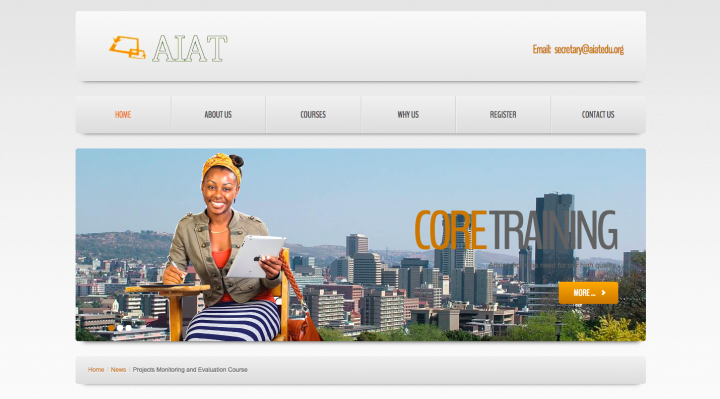
Published in: 2018
Publisher:
African Institute of Advanced Training (AIAT), Boksburg, South Africa
Author:
AIAT
Uploaded by:
Sterenn Philippe
Partner profile:
common upload
3861 Views
0 Downloads
AIAT offers a wide range of training programme suitable for Private Sector, Public sector, Government Parastatals and Non Governmental Organisation (NGO) Personnel/staff. AIAT is a training, research and consulting organization which provide Leadership and Strategic Management, Project and Logistics Management, Business Communication and Policy Analysis and Management programme aim at improving the knowledge and skills through training courses, workshops and seminars to private, public and Non-governmental sector at all levels.
PROJECTS MONITORING AND EVALUATION COURSE
Overview
This course familiarizes participants with various project monitoring and evaluation systems and tools that focus on results in international development. The course offers participants both a conceptual framework and practical skill development.
Course Outline
• Results-Based Management (RBM) in International Development
• Understanding and distinguishing between monitoring and evaluation in the context of RBM
• Results Chain: inputs, processes, outputs, outcomes and impacts for development projects, programs or strategies
• Importance of feedback and lessons learned
• Role of partners and stakeholders
• Significance of "soft" assistance
• Implications for country offices
Planning for and Executing on the Monitoring and Evaluation Processes
• Key principles for overall work planning
• Purpose and timing (including ex-post) of monitoring and evaluation
• Involving key partners and stakeholders
• Building monitoring and evaluation teams with defined roles and strong capabilities
• Establishing a hierarchy of project objectives
• Defining scope of monitoring and evaluations
• Selecting analytical tools, methodologies or approaches enabling measurement and attribution
• Importance of data quality and collection and baseline data
• Measuring and assessing project/program output relevance, efficiency and effectiveness in achieving outcomes
• Measuring and assessing level, sustainability, innovativeness, replicability and scalability of impacts from project/program outcomes on physical and financial assets; human assets; social capital and people's empowerment; food security; environment and communal resource base; institutions, policies and regulations
• Budgeting
• Managing monitoring and evaluation processes
• Anticipating and resolving problems
Tools, Methods and Approaches Facilitating Monitoring and Evaluation
• Performance indicators and common rating systems
• Logical framework approach (Log Frame)
• Theory-based evaluation
• Formal surveys
• Rapid appraisal methods
• Participatory methods
• Field visits
• Public expenditure tracking surveys
• Economic analysis, including cost-benefit and cost-effectiveness analysis
• Project evaluations
• Impact evaluation analysis
• Evaluation and tracking plans
• Annual reviews and reports
• Comparative overview of other tools, methods and approaches used by leading global institutions
Learning and Improvements
• Learning from evaluative evidence and applying recommendations from feedback
• Publication of evaluative evidence and feedback material
• Improving evaluation feedback
• Knowledge management
• Institutionalization of learning
DURATION AND VENUE
2 week
Mbabane,Swaziland.
Pretoria, South Africa.
Cape Town, South Africa
Dubai, UAE
WHO SHOULD ATTEND?
The course is designed for representatives from government, project teams, NGOs, multi and bi-lateral development organizations, consultancies, etc, that are typically employed as project managers and directors, M&E specialists, technical specialists, and researchers.
Bibliographic information
AIAT (2018). Project Management: Project Monitoring & Evaluation (PME). African Institute of Advanced Training (AIAT), Boksburg, South Africa
Filter tags
English Middle East & North Africa Sub-Saharan Africa Syllabus and course outlines (adult learning)














